
(JollofNews) – Ousainou Darboe has risen from being a human rights lawyer to becoming the symbol of resistance against government repression in the Gambia.
As a veteran lawyer, he is credited to have saved the lives of over 200 Gambians including the late Sherriff Mustapha Dibba of the opposition National Convention Party (NCP) and Pap Cheyassin Secka, a lawyer, both of whom were charged with treason for their alleged involvement in the 1981 failed uprising against the erstwhile Jawara regime.
As a jurist, Mr Darboe also successfully represented a large majority of those detained under the various emergency powers regulations promulgated by the then PPP government of ex-president Jawara.
Born in 1948, he attended Bansang Primary School before proceeding to Saint Augustine High School and Gambia High School in Banjul where he successfully completed his GCE O’ Levels and A’ Levels certificates respectively. He then left for Nigeria having won Commonwealth scholarship to study law.



After his return in May 1973, Mr Darboe took up appointment as a state prosecutor but could not be called to the Bar until November 1973 due to the state of the laws regulating the admission of lawyers to both the Nigerian and Gambian Bars. He also worked at the Attorney General’s Chambers; first as a state counsel, then acting registrar-general and subsequently legal draftsman before resigning in 1980 in protest against the government’s use of draconian laws to suppress rights of political opponents.
Originally from provincial Gambia, Mr Darboe is also celebrated as the first lawyer produced by the country’s largest ethnic group, the Mandinka tribe. And in August 1996, he was compelled to answer the call of his fellows Gambians who believe in democracy, constitutionalism and the rule of law to lead the United Democratic Party (UDP).
A charismatic and eloquent human rights barrister, Mr Darboe has always refused to subscribe to the idea of street protest to dislodge President Yahya Jammeh’s APRC regime from power, but was constantly arrested and detained with his supporters since he became President Jammeh’s credible challenger.
Despite regime’s heavy handed and confrontational attitude towards his party and supporters, Mr Darboe have always exercised caution and showed total respect to the laws of the


Gambia. He is a believer in democracy and have always maintained that the best way to effect a peaceful regime change in the Gambia is through the ballot box and not military coups and civil uprising.
Even when the odds are greatly against him, Mr Darboe contested four elections against Mr Jammeh and lost.
In June 2000, while on political campaign of rural Gambia ahead of the 2001 presidential elections, his convoy was ambushed by ruling party supporters resulting in the death of one of the attackers, Alieu Njie. Following the incident, Mr Darboe and 20 of his supporters were arrested and detained at Basse Police Station before being transferred to the high court in Banjul where they were granted bail.
While they were held in Basse, the state desperately tried to put pressure on a local magistrate for them to be remanded at Jangjangbureh prisons even when the court lacked the power to hear the case.

A few hours later, the magistrate was sent packing from his job.
While the case was ongoing, Mr Darboe in 2001 led a three party opposition in the general elections against Mr Jammeh and secured only 32.59 per cent of the votes. During the campaign, Mr Darboe and his supporters were subjected to various forms of harassment and intimidation by security officers and ruling party supporters. One of his supporter was shot dead by soldiers during a campaign rally in Tallingding.
Concerned at the lack of transparency in the electoral process, Mr Darboe’s UDP refused to take part in parliamentary elections held a few months later.
“I doubted the electoral commission’s ability to conduct a free and fair election after its handling of the presidential election in October. There have been massive transfers of votes from constituencies where the ruling party feels comfortable to constituencies where they do not,” Mr Darboe told the BBC.
Still determine to unseat Jammeh through the ballot box, Darboe’s UDP joined with four other opposition parties to form the National Alliance for


Democracy and Development (NADD), in preparation for elections in late 2006 and early 2007. The alliance nicked named by President Jammeh as ‘National Association of Donkey Drivers’, however, disintegrated after the UDP and the National Reconciliation Party (NRP) withdrew in early 2006.
In September of that same year, Mr Jammeh won a massive 67.33 per cent of the votes followed by Darboe, who only secured 26.69 per cent. A third candidate representing the remaining NADD parties, Halifa Sallah, finished a distant third with 5.98 per cent of the total vote cast.
In 2011, Mr Darboe was again defeated by Jammeh in a general election he described as “bogus” and “fraudulent”.
Following his party’s dismal performance in 2011 presidential polls, Mr Darboe has been performing a delicate political operation – attempting to maintain popularity and political momentum whilst holding series of political rallies across the country but thousands of supporters were prevented from proceeding with their much publicised country-wide tour in April 2015 after a standoff with security forces who barricaded the hi
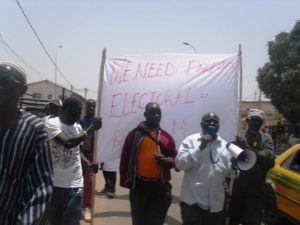

ghway outside Fass Njaga Choi village.
Although he is constitutionally barred from contesting future presidential elections due to his age, the 67 year old lawyer cum politician was unanimously re-elected in April 2016 at his party congress in Basse to lead the United Democratic Party as its secretary general.
Frustrated by the constitutional clause that prevent its leader to partake in 2016 presidential polls, the party’s national organising secretary, Ebrima Solo Sandeng, in April led a peaceful street protest against the regime of President Yahya Jammeh demanding electoral reforms ahead of December’s presidential polls.
Mr Sandeng, his deputy, Lang Marong and Fatoumatta Jawara, youth wing female president and several other party militants were arrested by Gambia’s feared security operatives despite the fact that the right to peaceful protest is recognised and guaranteed by the constitution of the Gambia.
Barely 24 hours after his arrest, Mr Sandeng was reported tortured and murdered by state security agents.
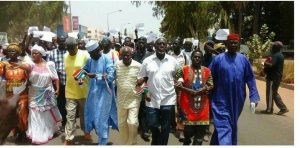

Not happy with the murder of his executive member, Mr Darboe led a peaceful protest to seek answers from the authorities but was confronted by armed security officers who fired tear gas and live ammunition at them.
Over 20 people including Mr Darboe were arrested and charged with various offences including unlawful assembly, riot, riotously interfering with traffic, holding a procession without a license and disobeying an order to disperse from an unlawful procession.
They were refused bail and remanded at the Mile Two prisons. After three months of detention, Mr Darboe and his supporters were sentenced to three years in prison after being found guilty by a high court judge.

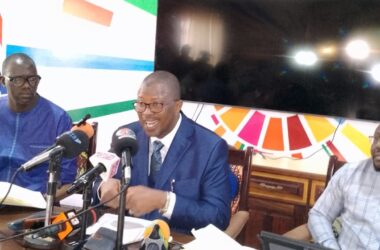
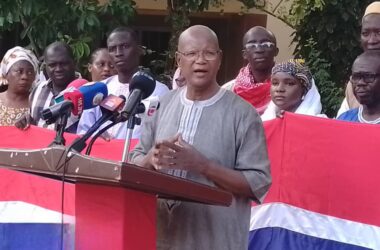
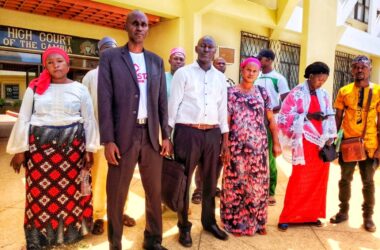
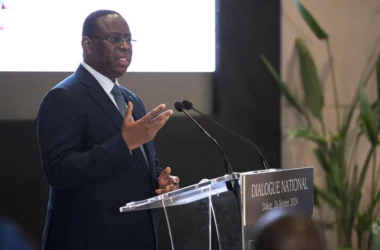
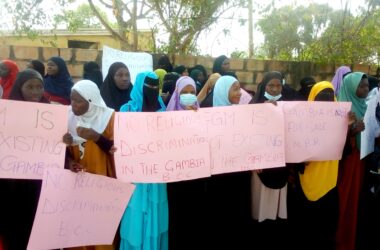
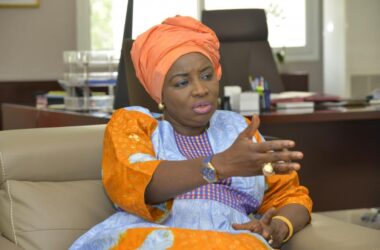

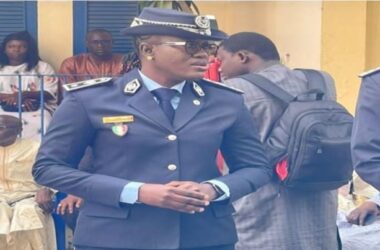
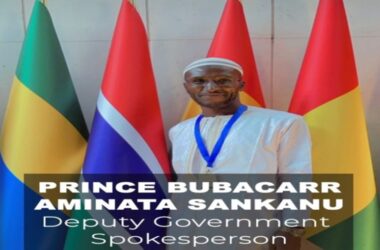

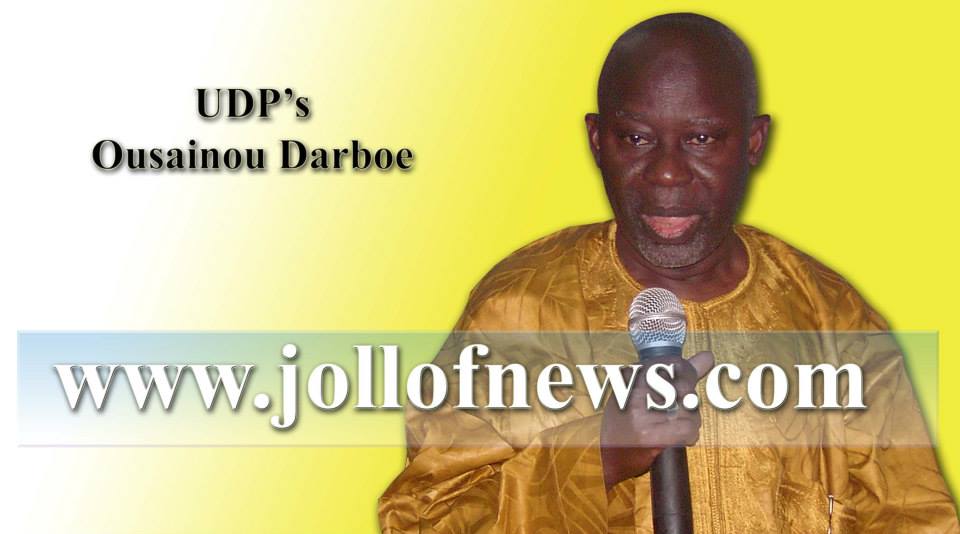
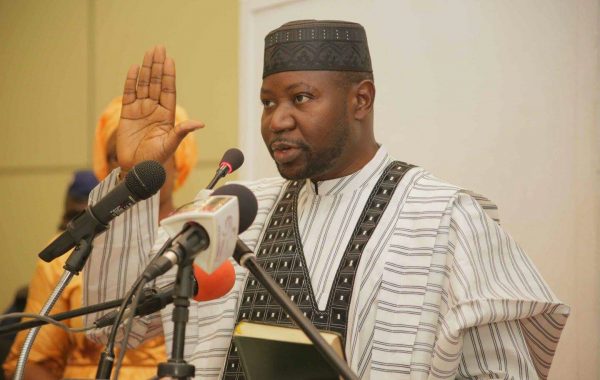
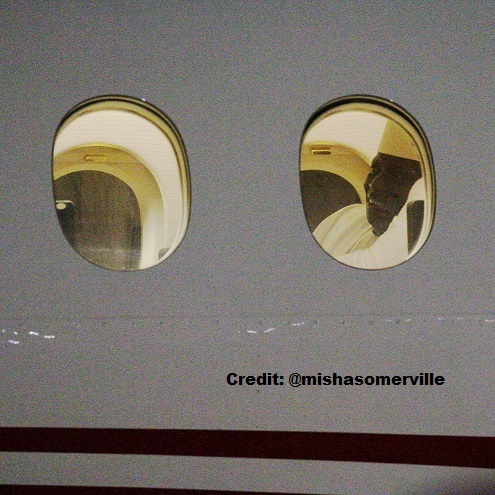
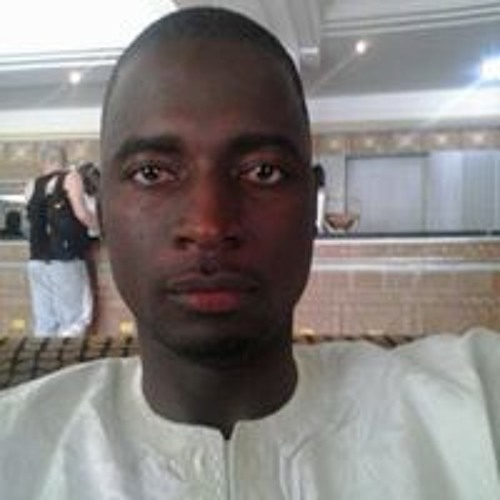

As we are all Gambian citizens, at this moment, what is going on in our country is second to known, we have people who take the problem in tribal version and others self interest and others as far as they are not affected or their close relatives, they don’t care what ever happens. All these above mentioned, will plunge the country into disaster and unknown future. Who can save the country? Why prominent and well educated are hiding behind, today when civil war starts in the country, there is no Gambian whose family will not be affected, so why are we not able to unite and save our country, now it depends to us either to unite for the sake of our children future or we face the worst and there after we regret.